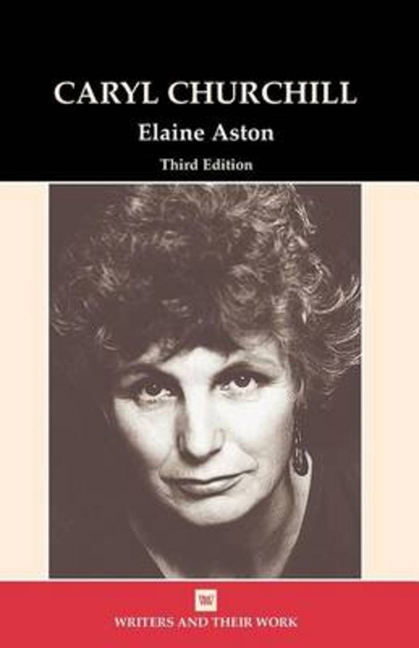Book contents
- Frontmatter
- Dedication
- Contents
- Acknowledgements
- Biographical Outline
- Abbreviations
- Preface
- Prologue
- 1 Beginnings: Radio, Stage and Television
- 2 The ‘Woman Writer’
- 3 The Dramatist as Socialist Critic
- 4 Communities in Dramatic Dialogue
- 5 Exploding Words and Worlds
- 6 1997 - Far Away
- 7 A Royal Court Celebration
- Notes
- Select Bibliography
- Index
1 - Beginnings: Radio, Stage and Television
- Frontmatter
- Dedication
- Contents
- Acknowledgements
- Biographical Outline
- Abbreviations
- Preface
- Prologue
- 1 Beginnings: Radio, Stage and Television
- 2 The ‘Woman Writer’
- 3 The Dramatist as Socialist Critic
- 4 Communities in Dramatic Dialogue
- 5 Exploding Words and Worlds
- 6 1997 - Far Away
- 7 A Royal Court Celebration
- Notes
- Select Bibliography
- Index
Summary
[I know] quite well what kind of society I would like: decentralized, nonauthoritarian, communist, nonsexist - a society in which people can be in touch with their feelings, and in control of their lives. But it always sounds both ridiculous and unattainable when you put it into words.
Caryl Churchill has been performing her radical, revisionist view of society for over thirty years in professional theatre and is now acknowledged as one of the foremost, innovative writers for the contemporary stage.
She began to write as a young girl, producing mostly short stories and poems. When asked in interview whether she started to write ‘because of a love of words’ Churchill observed of herself:
I don't know. That must be part of it. The fact that I was an only child may have helped. I had friends, but I did have quite a lot of time when I could be alone. Planning stories would be like solitary playing. I would invent a lot of characters, and descriptions of where they lived and maps, and it would be a whole game. So there was that sort of overlap. I also had a very close friend and we used to play a game which, looking back, reached a point where it was more like improvising plays.
One recollection she offered with certainty, however, was her early interest in the theatre:
I was also separately interested in the theatre. I liked going to plays. I used to want there to be plays done at school, and there weren't. When I was fifteen, I went off to a summer theatre in Canada, outside Montreal, and painted scenery. I didn't really put the two things together till a few years after that, at university.
During her childhood in the 1940s, which was spent largely in London, and her teenage years in the 1950s, by which time the family had relocated to Montreal, Canada, Churchill recollects listening to the radio rather than watching television. Her writing as a young adult reflects the influence of this medium. Among her early works, for example, is the play for voices, You've No Need to be Frightened written in 1959 during Churchill's university years (1957-60), spent back in England at Lady Margaret Hall, Oxford.
- Type
- Chapter
- Information
- Caryl Churchill , pp. 3 - 16Publisher: Liverpool University PressPrint publication year: 2010



